WHERE ALL STYLES COME TOGETHER
By:
The first time I met Adrian Gaspar was at the Improvision Orchestra concert and I immediately felt like I had known him for ages. He was open-minded, extremely friendly and quite clearly, passionate about his work.
Adrian was born in Romania, but his parents decided to move to Vienna when he was 9 years old so he could have classical musical education and a good start to his career as a pianist.
He invited me to his home, a small cozy apartment just across from Kunst Haus, where he can see this expressive, amazingly colourful, chaotic, but still beautiful and harmonious building from his window. The architect of Kunst Haus, Friedensreich Hundertwasser, insisted, that the local residents could decorate their windows and their part of the façade to their own taste. Adrian advocates a very similar idea in his work - every musician has their own role in the orchestra and in the abundance of these strong voices he is the one to weld together all the elements.
To compose for him does not mean to create something new. Adrian claims that ideas do not simply appear from nowhere and instead believes that different pieces of music already exist in the mind and in the memory. According to him, every composer has a right to use what already has been created before them and just make it work together. As a result Adrian’s music seems like a patchwork quilt - various bright pieces, that are skillfully sewn together.
When I asked Adrian how music came to his life, he just smiled and said that he always lived and breathed music.
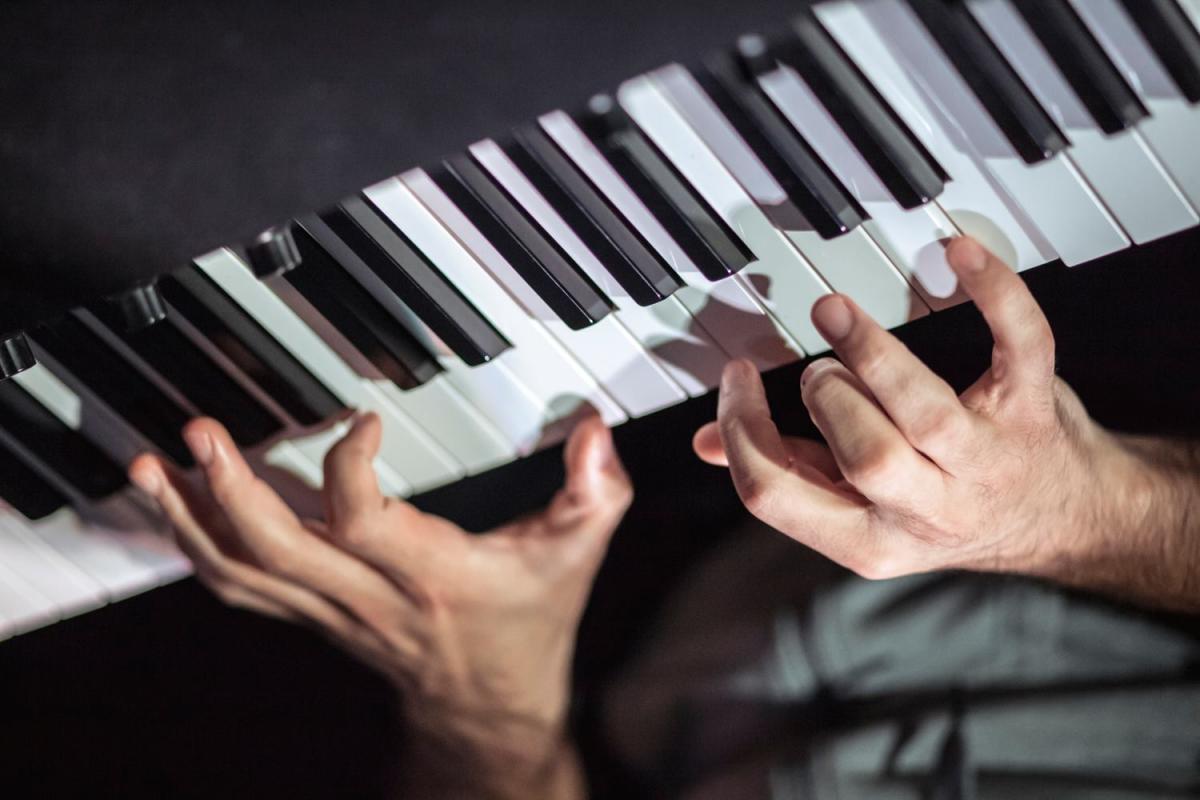
Adrian Gaspar © 2015
Yulia Belinskaya: How did you start to compose music?
Adrian Gaspar: It started with a football game. Two weeks before the final exam at musical school we had an all day football tournament and during the very last match I broke my left hand. Fortunately, having a broken hand meant I couldn’t play the piano for the final exam. During the following 4 weeks I was completely bored and tried to play only with my right hand. It was then for the first time that I played something that wasn't classical. I played Romanian, Balkan and Roma music and started to write music.
It was when I received my first diploma for composition that I felt something totally different. I felt that I could influence people around me with my music in a much more powerful way than just playing.
YB: How old were you when you started?
AG: I wrote my first composition when I was 8 and I received my first diploma at the age of 16. After this I made the decision to be a composer. At the beginning I had this naive fantasy that I would live in Hollywood and write music for movies. But I realised pretty soon that it is just not my way.
YB: And what is your way? How would you describe what you do now?
AG: I’ve always tried to show people a lot of diversity because I think this is really my strength, when compared to other good composers, pianists and jazz musicians. I hope I am good enough in these three areas, but maybe the very special thing about me is my ability to combine them all in one. Yes, if I had to describe it in one word it would be diversity.

Suno.music.festival, Munich 2015
YB: There is certainly an ethnic touch in what you write and you use a lot of national instruments. What is your fascination with it?
AG: I like the idea of combining different stories in one project as there are many styles of music that I really like and that have influenced me. For many years I tried to be strict and to play ‘clean’, like only jazz when playing jazz but then at a jam session when I allowed myself to play freely and to have fun, I suddenly realised that this was more ‘me’. I am quite chaotic, you know (laughs).
I like this very diverse music and I want it to be performed in a very authentic way. If you really want to play something like czardas, the typical Hungarian gipsy-style dance, you have to find somebody who has personal memories or connections to it.
YB: And how do you usually find these musicians?
AG: Jam sessions. It happens very often that after I tell people about my project, they say, you know, I play not only violin but also oud (Arabic string national instrument). And then you see that he can also sing Turkish songs.

IMPROVISION /// BALKAN¡X. Photo Robert Salamon © Romania, 2015
YB: So how does it feel to play with an orchestra, to lead it without any preparation?
AG: It is totally normal for me (laughs). I really trust them and I know that they are all very good musicians. Surely, they should trust me as well. They would not come if they didn't believe it would be good. So, apparently the magic of this orchestra is built on trust.
YB: Do you feel comfortable and confident with big orchestra?
AG: Yes, totally. When we started the Adrian Gaspar Orchestra we were very young. We were 15 boys and one girl. She was very funny and very pretty (laughs) so we had a rule: she was forbidden for all of us so it was only about music. But later, when we all became students of musical universities our lives got more complex and we never had any time. We also realised that one has to be paid for what one does. Because of this people were always changing, which is not a problem by itself however you cannot really improve the music under such conditions.
At the beginning of 2015 I came up with this concept of orchestra of mixed music. After this, a strange transformation happened: we were not an orchestra anymore, we were a collective of musicians, a collective of people. Every time we play we have new musicians, new instruments, new styles of music, new tunes. It was the second concert that you heard, and there were some complications, we were starting some compositions all over again and again. But the product that we have in the end - this is what really counts. When I say product I mean everything - the music, the audience, but the collective in the first place.
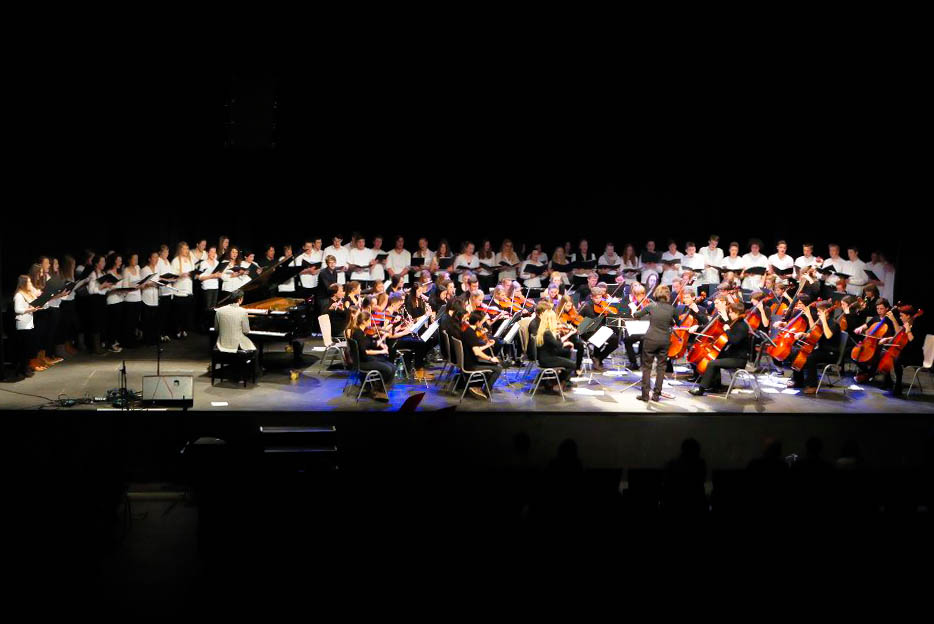
Adrian Gaspar and Improvision Orchestra. Karlsruhe, 2015
YB: How do you write the music? Do you sit with a pen and a paper?
AG: When I was younger I really liked to do exactly this - to sit in a cafe, usually in Kreuzberg, and to write by hand. Actually, I am still always at Kreuzberg. A couple of years ago though I started to work with computer software (Sibelius, for example) as I realised how practical it is when you can immediately hear what you have written.
But I never write the whole score as we don't need it for this project. I know every musician, I know what each of them needs. Some of them don't receive any notes, some get many and everyone of them has his/her very own role. In the end I have a collective of very diverse and sometimes totally crazy artists.
YB: What are your non-musical inspirations?
Andrian thinks for a long while before he answers: I am inspired when I am in love. Especially, when it is unrequited. I wrote my best things when I was deeply in love and totally depressed.
But to be honest, it is a quite hard question, because music is and always was my main inspiration. I am listening to it non-stop. I think music constitutes more than 95% of my life.
YB: Could you name some main musical inspirations then?
AG: Aziza Mustafa Zadeh from Azerbaijan. I listened to her when I was 15-16. I think this was a huge influence though maybe not so consciously at the time. Or when I was 8 I listened to Gheorghe Zamfir, the most famous Romanian musician, after George Enescu.
YB: How many instruments do you play?
AG: I only play piano.
YB: But this is not true. I saw you playing the drums.
AG: Yes, I love playing the drums. When I was a kid I dreamed about playing drums. But we didn't have any and we didn't have the space. Or maybe it was just what my parents were telling me. Last year I started to practice a lot, so I would call it my new hobby. You cannot imagine, how great it feels. You don't need to think about harmonics or melodics, you just sit there and play.
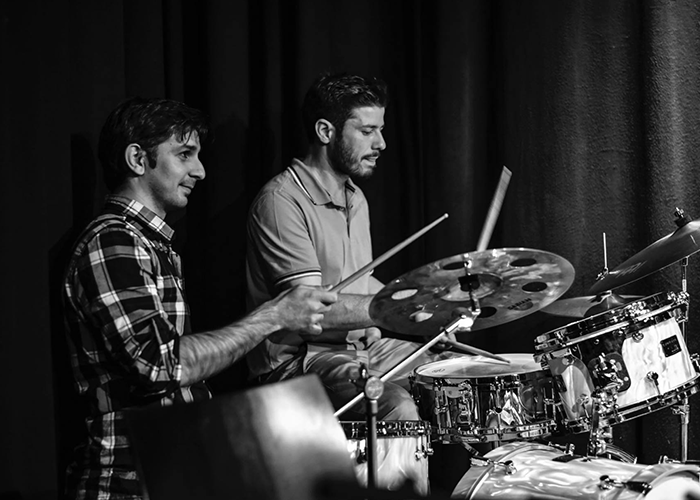
Adrian Gaspar and Nevyan Lenkov. Suno.music.festival, Munich 2015.
YB: Do you always play with an orchestra or is it possible that musicians perform your pieces without you?
AG: Actually I play all the time, sometimes even too much. When I listen to the records I often think that I probably shouldn't play this part next time. But if we speak about Improvision Orchestra, my goal is to have a collective of musicians, as I told you, and to keep it very open. Maybe one day instead of 15 people, I could have 30-40 people and then I won’t play, I will just write.
YB: What do you think about the contemporary music for example, noise music?
AG: Well, I am not into it. I tried it because at University you have to and it was splendid. But to write only this style of music for me wouldn’t be an option. For me music is still something that should be beautiful as well. I totally understand that these artistic statements should exist. We should have right to write anything we want. Thisi s what it means to be free as a composer. And I like freedom. But music for me is a feeling, and you feel much more and it is more intense when music is good and touching.
YB: So, you do care that people enjoy your music.
AG: Now yes. Some years ago it was the same experience that every composer and every musician has to go through. I mean the attempt to reach the borders, to push the limits, to go deep into yourself. Sounds sophisticated, but in reality you just do a lot of crazy things. And then learn from it: where you could go and where you would like to go.
But the reason I play music is that I can choose what I will play. If I share my passion and joy with the musicians, we as a collective can then share it with the audience. I try to reach everyone, but the first thing that matters is what I personally like. You could think this is egoistic, but I suppose, it is our right, as musicians or artists. And it is fair, because if I had to play something I do not enjoy, who would enjoy it then?
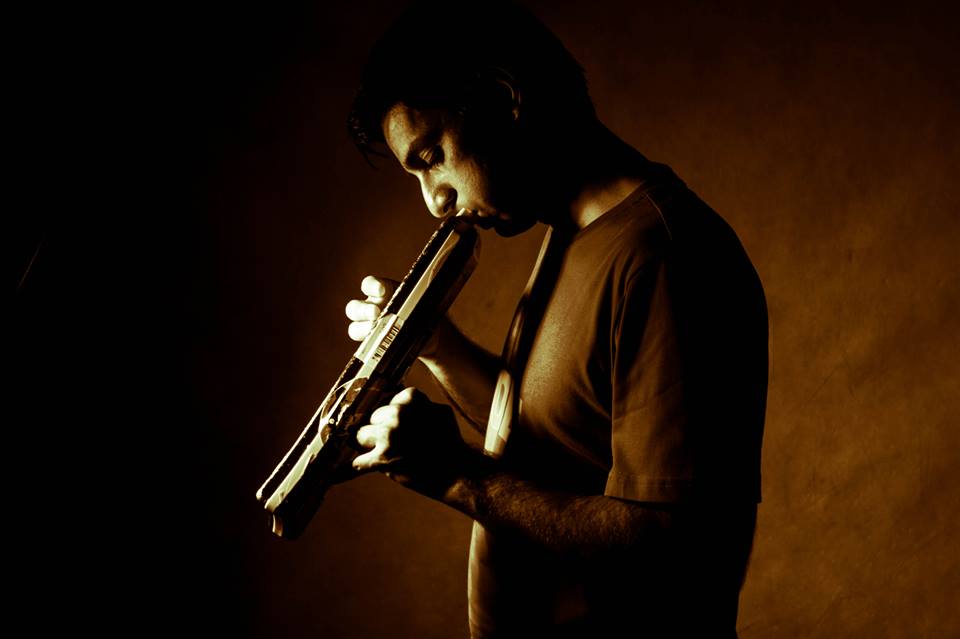
Adrian Gaspar © 2015
YB: As you already said, you didn't choose Vienna as a city to live, but if you had a choice, would you stay here or move to another place? Where would it be?
AG: I didn't choose it and I cannot really get out (laughs). I can imagine living in any other city, but just for a while. Vienna is my home, I grew up here. I know the locations, where I feel well playing. And actually, Vienna is a brand, it is always great to say “I am a Vienna-based musician”.
YB: Tell me about this new project that starts in January.
AG: It is not really a new project, I already did something like this in 2014 in Germany and now I am really excited to do it here in Vienna. The main difference is that now I have better understanding of what should happen. It is basically a series of concerts, one concert a month, January till June, each time with a new topic. I also want to try musicians in different roles. There will be many exciting experiments, I promise.
YB: What topics will be there?
AG: The January theme is fun-key. We will play 4-5 funky and fusion tunes and from them I would choose one to use with the big orchestra. Then it will be the Balkan project where I hope to add more Romanian music. I found this amazing panflute player who can play so authentically. In May it will be very special. I call it “La undecima”. As it is our 11th year with this orchestra project there will be 11 musicians and we will play 11 tunes. And I hope Real Madrid will win its 11th title. So everything now depends on Real (laughs).
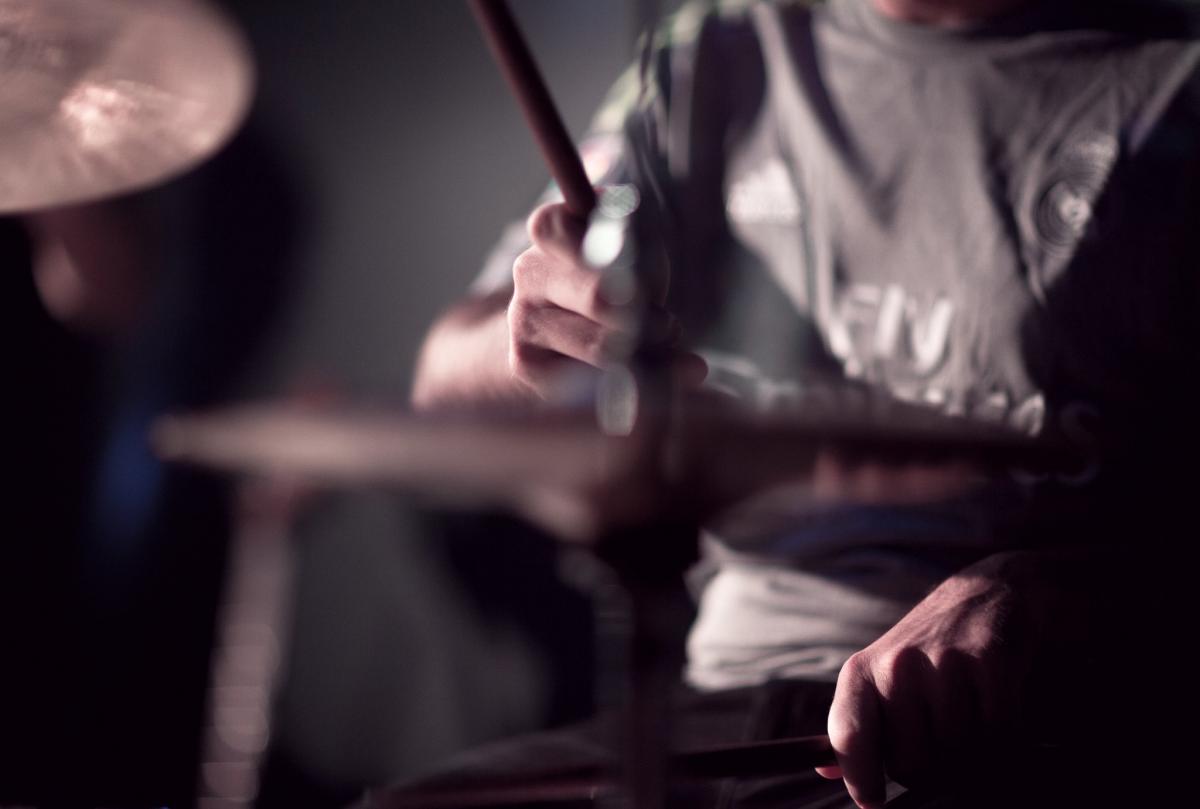
Adrian Gaspar © 2015
_____________________________
The first concert will take place on 16 of January, at Schwarzberg. TEASER.


